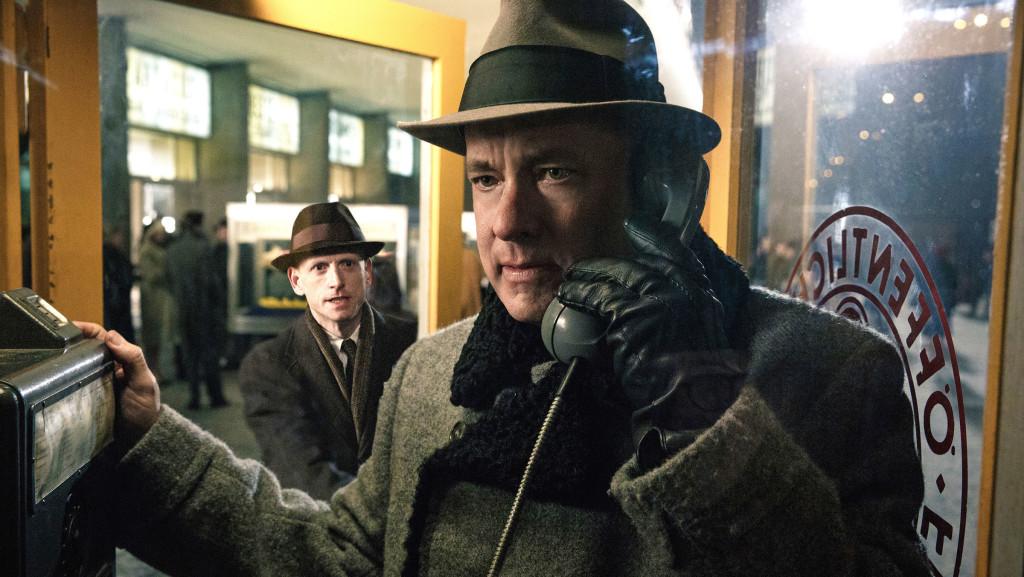A middle-aged man sits on a park bench to paint, surreptitiously prying a coin from the bench’s underside as he does so. Returning home to his modest apartment, he proceeds to split the coin open with a razor blade and retrieve the secret message that was folded up inside. He begins to read the message only to watch as a platoon of FBI agents swarm into the room and promptly arrest him. It quickly becomes apparent that this unassuming individual is neither a fugitive nor a career criminal, but a national security threat — a threat who is about to forever change the history of the United States.
It is from this opening scene that “Bridge of Spies,” a dramatic thriller inspired by a series of historic events, recreates a world gripped by fear and paranoia — a world where words are considered the ultimate weapon and where no one, American or Russian, is considered safe. Directed by three-time Academy Award–winning director Steven Spielberg, the film stars Tom Hanks as James Donovan, a successful insurance claims lawyer who is recruited by the federal government to represent alleged Soviet intelligence officer Rudolf Abel (Mark Rylance). Determined to ensure Abel receives a fair trial regardless of his nationality, James agrees only to find himself thrust onto the front lines of the escalating Cold War when he is asked to take on a mission that promises to send shockwaves throughout the world.
Spielberg has been known for not only focusing on chapters of the world’s history, but addressing humanistic issues ranging from the Holocaust to terrorism. But unlike his past successes, “Bridge of Spies” shatters expectations by forgoing textbook accounts in favor of a more dynamic approach. By focusing specifically on the men at the center of the crisis, Spielberg imbues the film with a sense of honesty rarely seen in historical dramas and allows viewers to witness firsthand the events that culminated in what is perhaps the most legendary prisoner exchange between East and West.
Hanks is undoubtedly the film’s most compelling element, brilliantly depicting a man who strongly believes in liberty and justice for all. He delves into his character when he is either making a legal argument in a court of law or attempting to share his beliefs with those who doubt him. Opposite him is Rylance, whose wonderfully naturalistic performance as the witty yet philosophical Soviet agent nearly steals the show. Although he initially comes across as a selfless patriot like Hanks’ character, Rylance builds his character up to a point where he is not afraid of what happens when he returns to East Berlin.
Rounding out the cast are Amy Ryan, whose sweet scenes as James’ wife Mary provide the heart of the film, and Emmy Award and Golden Globe Award winner Alan Alda, who crafts one of his most engaging performances as the relentless Thomas Watters. Both actors not only provide a glimpse into James’ personal life, but allow viewers to sympathize with him and understand that behind the clean-cut facade is a man who struggles to make difficult choices for those around him.
The running time, which is over two hours, feels longer because some scenes feel as if they were lengthened in order to counteract the scenes where there was just dialogue. However, this issue is ultimately inconsequential to the film as a whole.
The true brilliance of this film is that, like James Ponsoldt’s “The End of the Tour,” much happens without much happening. Viewers learn so much about the players in this central drama just by hearing them speak to one another or going about their day-to-day lives. Although there are no cataclysmic moments or claustrophobic firefights, “Bridge of Spies” is never dull and shows viewers that, even in the darkest hour, there are those who aren’t afraid to show the world what they stand for.
While it may come across as another serious historical drama at first glance, “Bridge of Spies” is both a film that waxes poetic on the ideals America was founded upon and an absorbing tale for anyone who dares to speak out against society’s wrongdoings. Anyone whose rights have been denied because of their nationality, race or religion will find “Bridge of Spies” to be a truly inspiring piece — one that reminds audiences of what it really means to do the right thing.




















